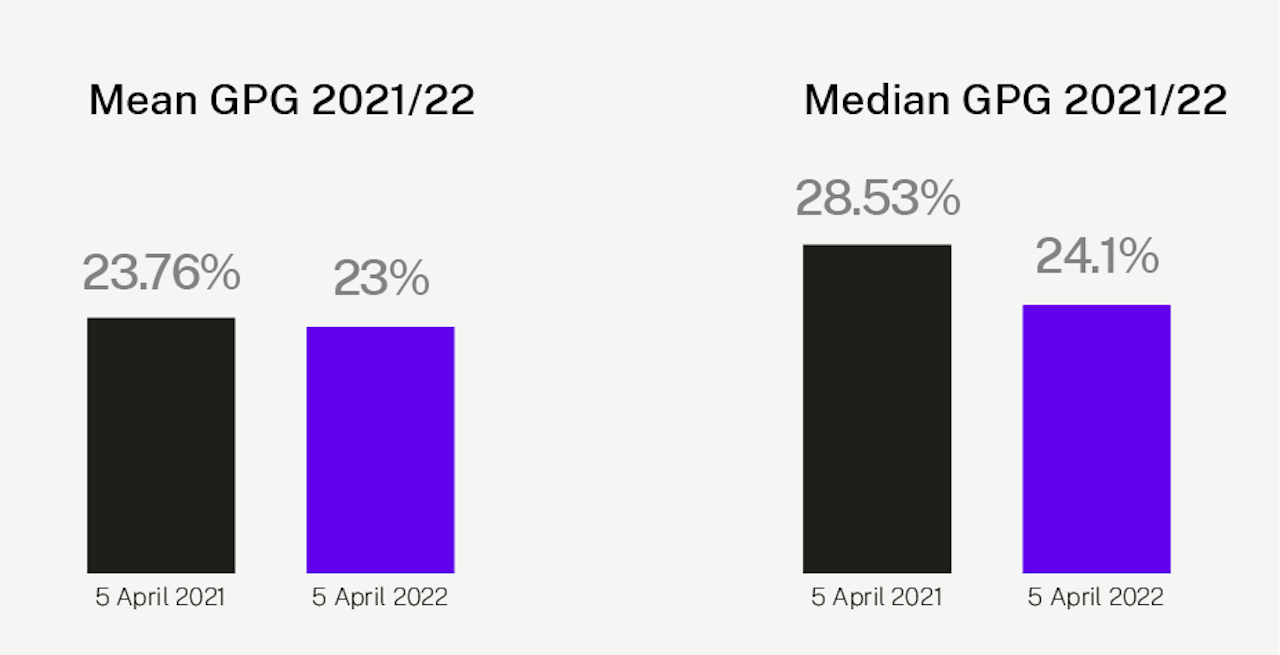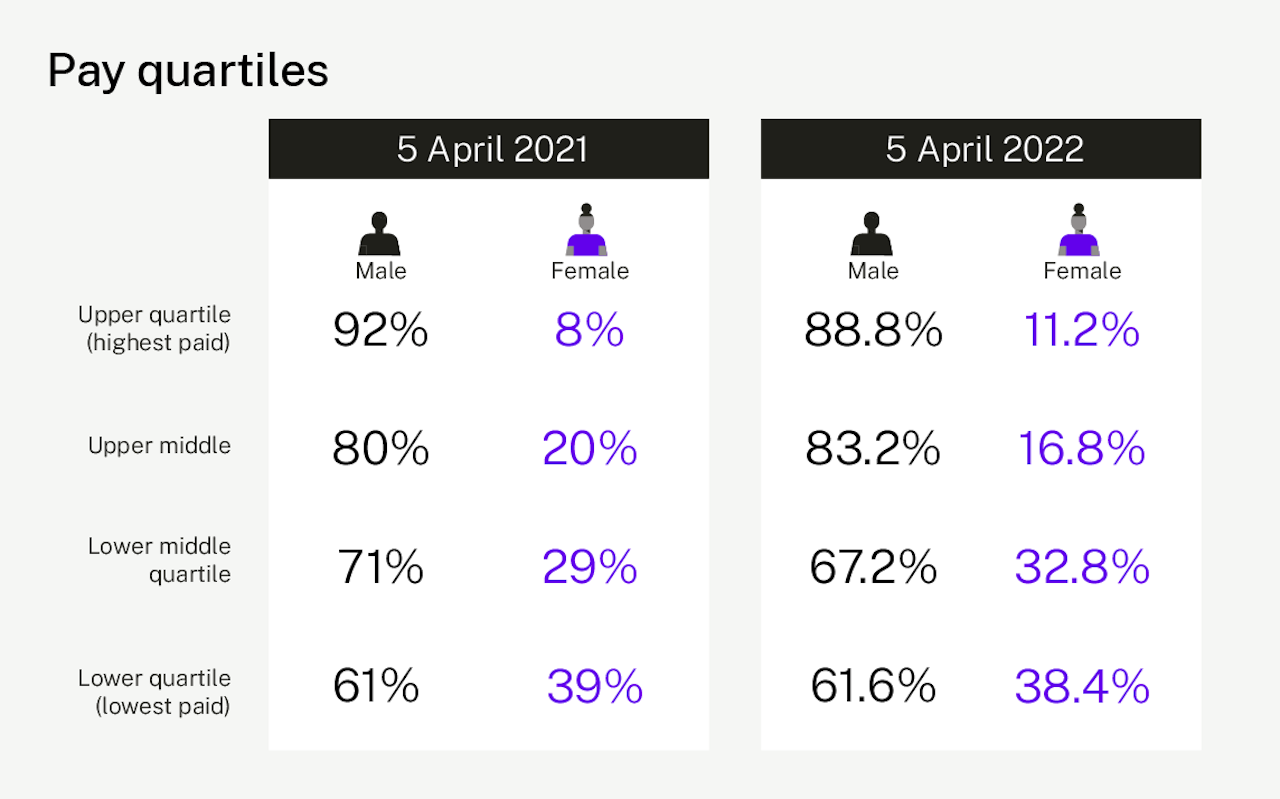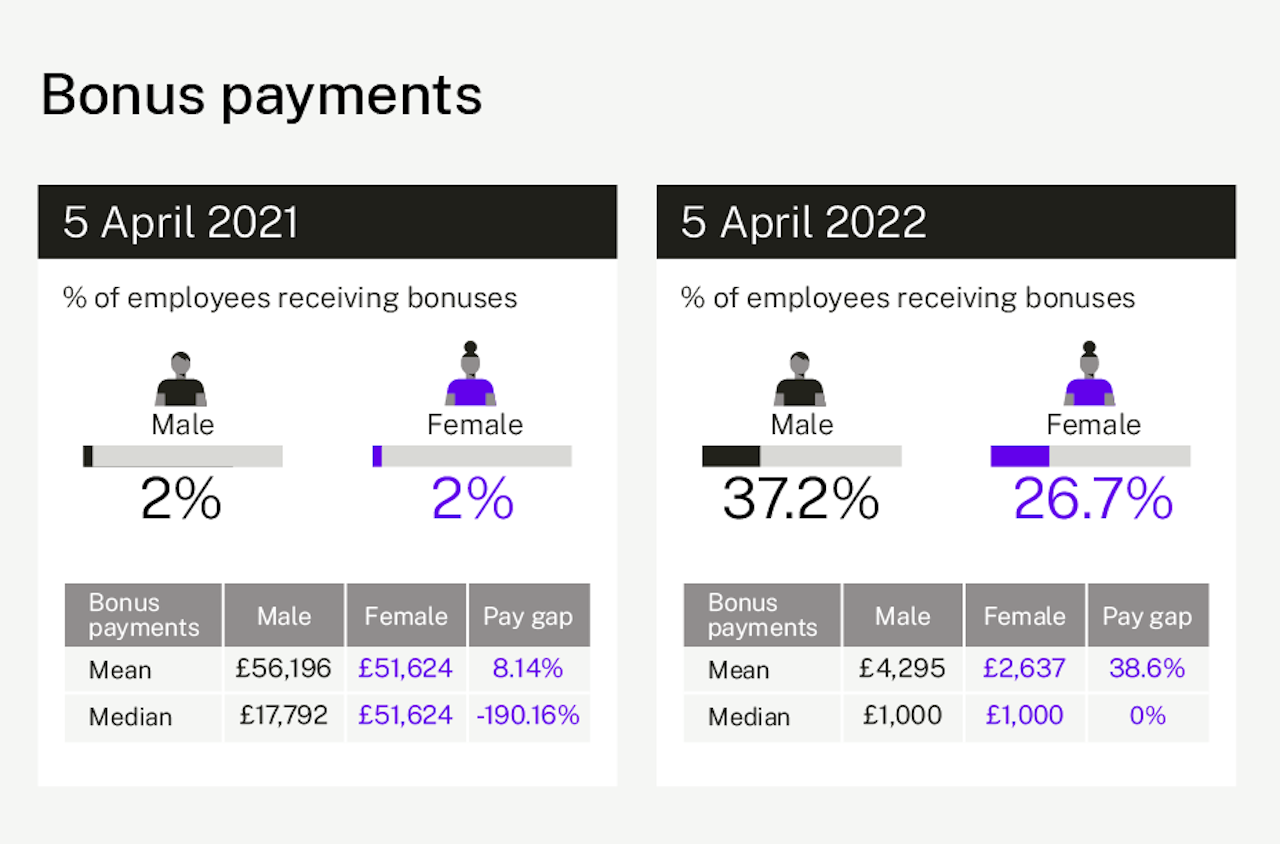Today, we are releasing our annual gender pay gap report for 2021/22 alongside an update on the actions we committed to last year.
What is the gender pay gap?
The gender pay gap report highlights the difference in average earnings between women and men across all job levels in an organisation. This report covers Improbable’s UK employees only and excludes the Defence LLC and The Multiplayer Group entities within our group.
Improbable is building virtual worlds and defining the metaverse and its future evolution. We’re seeking new ways to connect people and amplify their lives. To build this, we need diverse community representation at all levels of our organisation, as well as a workplace where everyone can innovate, grow and belong.
2022 was a pivotal year for Improbable. We doubled down on the metaverse and transitioned to a model designed to best serve our metaverse partners. Together with our Leadership Team, we have established our 2023 Diversity, Inclusion and Belonging strategy. We’re committed to establishing the structures, processes, communities and frameworks to tackle the areas of focus identified in the report.
Although the gender definitions in our gender pay gap report are based on current legal definitions and collection requirements, at Improbable we believe employees should identify with the gender that feels right for them. Improbable is committed to treating everyone fairly regardless of gender identity.
What is Improbable’s gender pay gap?
Our gender pay gap reports that our UK female representation increased by 3.5 percentage points to 24.8%, and that our gender pay gap decreased 0.76 percentage points to 23% (mean) and 4.43 percentage points to 24.1% (median). This is a small improvement on our report last year but we know we have a lot more work to do to reduce this gap as quickly as possible.
One of the biggest reasons for our gender pay gap is the lower number of females in technical and senior leadership roles compared to their male counterparts. We know we will need to take positive and proactive steps in both the ways we hire and also our early talent programmes to sustainably address our representation challenges.

Pay quartiles
The chart below shows the gender split within four equal quartiles and the percentage of female and male employees within each salary quartile. The upper quartile is the top 25% of earners. There has been a slight increase in women in our upper quartile of 3.2 percentage points to 11.2% since 2021. We recognise that this is still significantly below the overall representation of women at Improbable.

Proportion receiving a bonus
If eligible, Improbable employees can receive sales, performance and sign-on bonuses. In April 2022, 26.7% of females and 37.2% of males received bonuses. Due to more men being in senior positions and sales roles in our company, more men have received bonuses.
Bonus payments
In April 2022, Improbable had a 0% median bonus gap between males and females. As we’ve seen an increase in both males and females receiving a bonus this year, our mean bonus gap has increased to 38.6%. This is due to senior positions predominantly being held by males in the organisation, meaning they are eligible for a higher sign-on bonus payment.

What are we doing to reduce our gender pay gap?
We are building on our commitments from our 2021 report published last year to continue to address our representation challenges in a holistic and sustainable way.
- Mentoring for women: In 2022, our Women@IO community included over 100 women meeting on a monthly basis. The community launched a mentoring scheme to support women across Improbable, to develop and achieve their career goals and the opportunity to be mentored by senior female executives.
In 2023, Improbable’s first Lean In Network was launched, designed to give members further access to peer support and mentorship, career development, and mentoring opportunities with leaders as part of our new Manager Academy.
- Communication and clarity: In 2022, we increased visibility of vacancies internally by advertising all open roles in our weekly internal newsletter and across our company Slack channels. Our compensation philosophy and process was published on our intranet as part of our commitment to be more transparent with regards to compensation at Improbable.
Going further, we will continually and annually review salary bands to ensure that we are competitive, and we will work with leadership to adjust them to ensure internal and external parity.
- Data: We measure and monitor gender and ethnicity data on hiring, attrition, engagement and representation at all levels, and we conduct audits on our performance rounds to ensure equity in our processes. For example, on average throughout 2022, our new starters have been 28% female. This is above our current profile, although we recognise this needs to be significantly higher to drive the change we want to see. We have also increased the representation of females at Manager level and above from 13.9% to 15.5% since we reported in April 2021 and to 19.2% by December 2022.
In 2023, we’ll continue to use demographic data alongside our processes and engagement tools to identify and disrupt bias as well as provide better support and experiences for different demographics.
- Company-wide education: Throughout 2022, we invested in company-wide education. Over 30 sessions were conducted on Bias, Empathy, Workplace Dilemmas, Values and LGBT inclusion, with over 400 employees and leaders in attendance.
In 2023, inclusion education will continue to be a fundamental part of our strategy, including workshops on neurodiversity, parental leave, allyship and Google’s #IAmRemarkable workshops targeted specifically at underrepresented groups.
- Career progression: Following a year of transition, we are changing how we operate and have committed to creating Career Paths in 2023 for all roles in the organisation. This will set clear expectations and goals for how people can grow their careers, leading to more equitable outcomes.
Other areas of progress in 2022
- Flexibility: Societally in the UK, women take up the majority of primary care roles, meaning they require more flexibility at work. As a remote-first organisation, we offered employees the flexibility to manage their home, life and work commitments in a way that works for them, with the majority of roles having no requirements on time spent in the office.
- Female health: In July 2022, we introduced antenatal care leave, so both primary and secondary caregivers could attend antenatal appointments without any impact on health and sick leave. Over 50 hours have been utilised so far. We also provided support and awareness on baby loss.
We launched our Menopause and Period Guide to educate leaders and to set out the support available to women before, during and after the menopause as well as those who experience PMS or period pains. Over 60 people attended our Menopause Awareness sessions delivered by menopause experts Positive Pause.
- Hiring: In 2022, we trained a further 75 hiring managers in interview training, driving better consistency in the ways we interview, and educating hiring managers on how bias can show up in interviews.
Our Early Careers programmes brought us a great representation of talent. Our 2022 Graduate, Intern and Apprenticeship intake was 31% female – almost 10% above our overall female demographic.
The work that was undertaken in the 2021 reporting period will continue to be embedded alongside our 2023 Diversity, Inclusion and Belonging Strategy. This will focus on laying the solid foundations we will require for long term sustainable success within Diversity, Inclusion and Belonging at Improbable. Further updates about our 2023 strategy will be published shortly.
Statutory declaration
We confirm that the information and data in this report are accurate and in line with the requirements of the gender pay gap reporting regulations.
Signed by:
- David Barker, VP People
- Herman Narula, CEO
